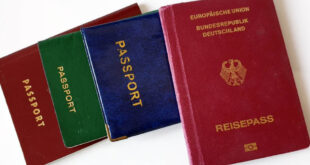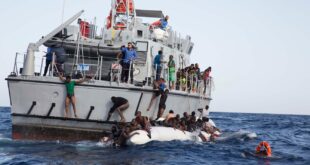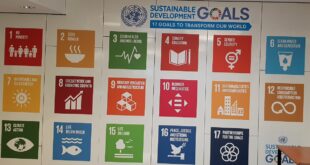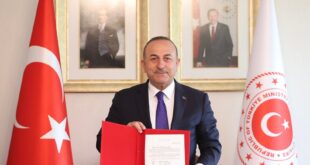Hours after the Italian Lower House and Senate approved the government’s plan to send a “limited naval mission” to help Libya’s coastguard curb migrant flows on Wednesday, Rome deployed two ships for patrols into the waters of the North African country.
The mission is Italy’s boldest efforts so far to slow down the arrival of migrants from Africa.
Italy initially hoped to send six ships, but had to downsize the mission following objections from the UN-backed administration in Tripoli.
Italy hopes that sending migrants back to Libya will have a significant deterrent effect, as most of the over 95,000 migrants who landed in Italy so far this year started their journey across the Mediterranean Sea from Libya.
The naval mission has been criticised by rights groups, who argue that Italy is sending migrants back to inhumane conditions and possible torture.
“After years of saving lives at sea, Italy is preparing to help Libyan forces who are known to detain people in conditions that expose them to a real risk of torture, sexual violence, and forced labour,” Human Rights Watch’s Judith Sunderland said.
Meanwhile, Gen. Khalifa Haftar, the head of the factional government based in eastern Libya, has strongly objected to the Italian mission. The head of the self-styled Libyan National Army (LNA) has vowed to repel any Italian ships approaching Libya’s waters without permission.
Libya is torn in two between the eastern-based government, which supports Haftar, and the UN-backed government based in Tripoli, which supports the deal.
Haftar’s order was reportedly issued a few hours after the Torbuk parliament, allied to his faction, expressed opposition to the Italian naval operation, saying the presence of foreign vessels in Libyan waters represented a ”violation of national sovereignty”.
The Haftar-led government said Italy wanted to “export the illegal immigration crisis from its territory to Libya’s”, adding that the return of tens of thousands of migrants would have a “dangerous impact” on Libya’s security, economy and society.
Meanwhile the competing UN-backed government in Tripoli will co-operate in all operations and must give permission for any Italian ship to deploy off Libya.

In a related development, Italy’s coastguard has seized a migrant rescue boat in the Mediterranean Sea, which it suspected of aiding illegal immigration from Libya. The boat Iuventa, operated by Jugend Rettet, a German aid group that did not sign up to Italy’s new code of conduct designed for NGOs, was escorted to the Italian island of Lampedusa by coastguard vessels on Wednesday.
Italian news agency Ansa reported that the move was ordered by a judge from the western Sicilian town of Trapani, as a “preventive seizure”, and is related to a probe into “alleged aiding” of illegal immigration.
Ambrogio Cartosio, chief prosecutor in Trapani, was quoted by Reuters to have said that his investigation into Jugend Rettet was ongoing and no one has been charged yet.
“The evidence is serious,” he said, adding: “We have evidence of encounters between traffickers, who escorted illegal immigrants to the Iuventa, and members of the boat’s crew.”
However, Cartosio said there was no indication that Jugend Rettet had received money from Libya-based traffickers. “It would be fantasy to say there was a co-ordinated plan between the NGOs and the Libyan traffickers,” he said.
Earlier this week, Italy asked some nine NGOs, active in rescue missions in the Mediterranean Sea, to sign a code of conduct that was backed by the European Commission. One of the new requirements for NGOs is to have an armed police officer on board.
Five groups, including the German NGO, refused, saying they were following international and maritime laws, and the new rules could lead to more deaths at sea.
Jugend Rettet, founded in 2015 in response to the refugee crisis, says that it saved thousands of lives in 2016.
Kwame Appiah with agency reports
 THE AFRICAN COURIER. Reporting Africa and its Diaspora! The African Courier is an international magazine published in Germany to report on Africa and the Diaspora African experience. The first issue of the bimonthly magazine appeared on the newsstands on 15 February 1998. The African Courier is a communication forum for European-African political, economic and cultural exchanges, and a voice for Africa in Europe.
THE AFRICAN COURIER. Reporting Africa and its Diaspora! The African Courier is an international magazine published in Germany to report on Africa and the Diaspora African experience. The first issue of the bimonthly magazine appeared on the newsstands on 15 February 1998. The African Courier is a communication forum for European-African political, economic and cultural exchanges, and a voice for Africa in Europe.






























